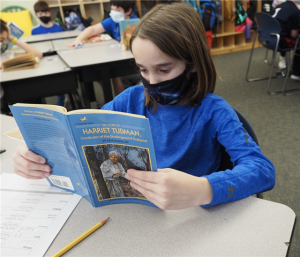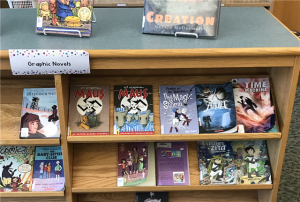The skills we teach at Mirowitz are many, but I’d be hard pressed to think any is more important than reading. Besides the obvious role of literacy in creating opportunities in life, literacy builds knowledge, perspective, language and leads to critical thinking. The number of minutes a child reads has an impact on their future academic and social emotional success. So naturally, we are not satisfied unless each student has developed not only reading skills, but also a love of reading both for pleasure and for information. 
So, when there is a movement in our country to ban books, purge public school libraries and censor content in schools, we take that very seriously.
You may have heard that the Holocaust memoir Maus was recently banned in a public school district in Tennessee. So…our 8th graders are reading it.
 Maus is a graphic memoir. It’s based on a true story and the experiences of the author’s Jewish family during the Holocaust. In addition to integrating Jewish history and exposing kids to a new literary genre, it’s also an opportunity to explore freedom of thought. Our students will engage in Socratic dialogue about book banning, and explore why THIS particular book, a memoir about the Holocaust, is being banned. They will consider what might replace it in schools, and why it is important to read books that make us feel uncomfortable.
Maus is a graphic memoir. It’s based on a true story and the experiences of the author’s Jewish family during the Holocaust. In addition to integrating Jewish history and exposing kids to a new literary genre, it’s also an opportunity to explore freedom of thought. Our students will engage in Socratic dialogue about book banning, and explore why THIS particular book, a memoir about the Holocaust, is being banned. They will consider what might replace it in schools, and why it is important to read books that make us feel uncomfortable.
Our goal is not to lead students to particular answers, but to provoke deep thinking, to stimulate conversations and to leave room for diverse perspectives.
During their years at Mirowitz, students read Farenheit 451 (a banned book about book banning), Shakespeare, Greek Myths and yes, Torah…all texts that broach on uncomfortable topics. We allow them — safely and in a controlled setting — to grapple with discomfort because the grappling itself is essential for learning. Doing so allows them to engage with reading on an intellectual level, to develop their own perspectives and to understand the world they will be leading one day.
This Shabbat, pursue these lists of banned books. If you decide to read a book as a family, be sure to discuss not only the content, but what people found so disturbing in the book that they wanted to ban it. Discuss to what extent it was a product of its time or whether it defied social norms of its era. Discuss the concept of open access to ideas.
The bonus of this read aloud time will be the quality time they spend with you and the message you send through your actions that reading is something that provokes deep thinking and a skill they will enjoy for a lifetime.
שבת שלום,

